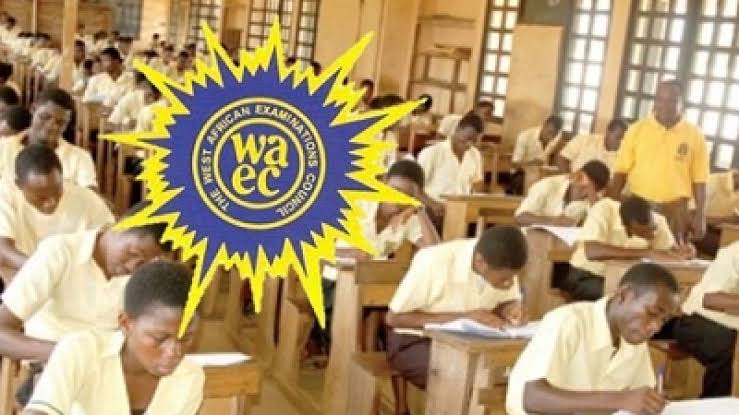Waec Physics 2022 Answers – 15th June 2022
Waec Physics Answers 2022: here are the verified Waec 2022 Physics questions and answers for SS3 students for Wednesday 15th June 2022. Waec 2022 Physics Questions and Answers.
Waec Physics Answers 2022 for 15th June 2022 with questions objective and essay 100% verified official questions and answers for senior secondary schools.
WAEC Physics Questions And Answers 2022 (Theory & Obj), EXPO: WAEC Physics Questions and Answers 2022/2023, 2022/2023 WAEC EXPO ON PHYSICS QUESTIONS, 2022 Physics Questions & Answers [Essay-Obj] is Out.
Waec Physics Answers 2022
Wednesday, 15th June 2022
- Physics 2 (Essay) 09:30am – 11:00am
- Physics 1 (Objective) 11:00am – 12:15pm
Waec 2022 Physics Questions and Answers
WAEC PHYSICS 2022 QUESTIONS AND ANSWERS
Wednesday, 15th June 2022
- Physics 2 (Essay) 09:30am – 11:00am
- Physics 1 (Objective) 11:00am – 12:15pm
======================
======================
WAEC PHYSICS OBJ ANSWERS;
PHYSICS OBJ
1-10: BCABBDDACA
11-20: CABCBDBDBD
21-30: ABCCBBAADA
31-40: BCDBCBACDA
41-50: DACBDDDBAA
Completed.
======================
======================
WAEC PHYSICS ESSAY ANSWERS;
===========
(NO 1)
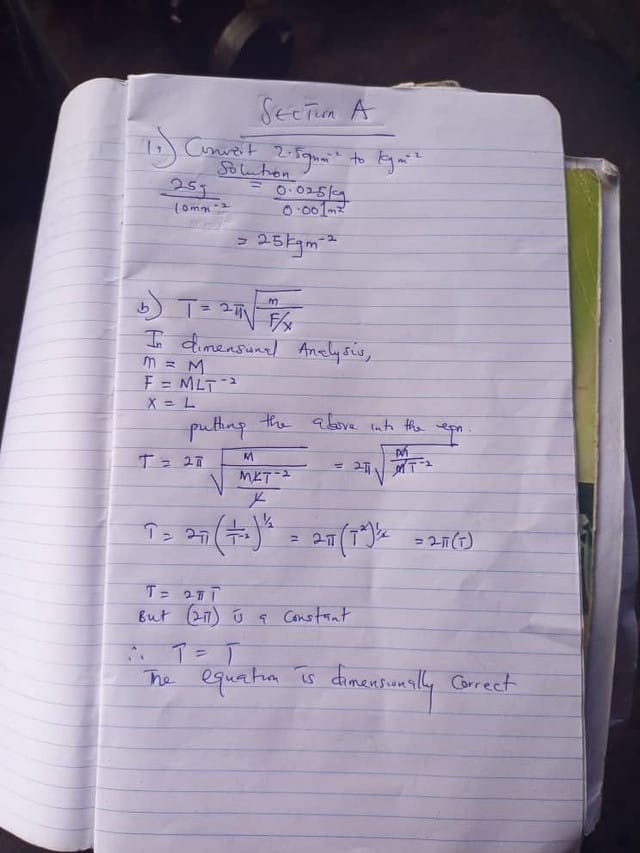
==========
(NO 4, 2, 5, 1)
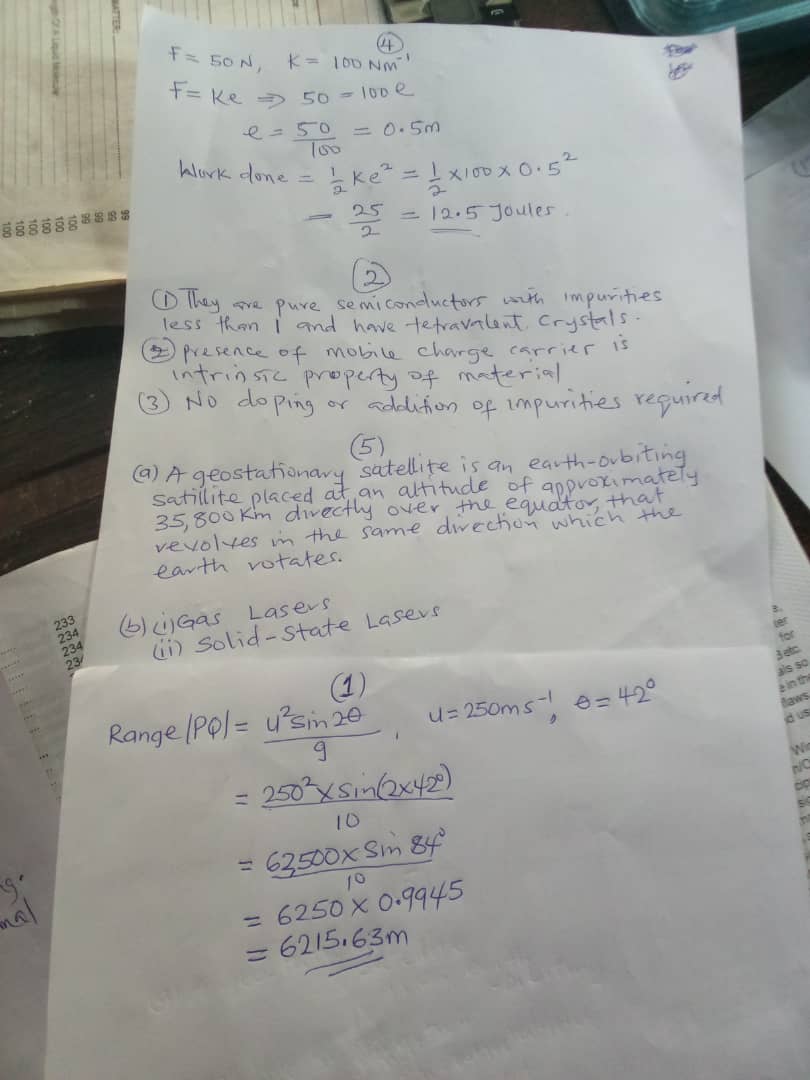
(5a)
A geostationary satellite is an earth-orbiting satellite, placed at an altitude of approximately 35,800 kilometers (22,300 miles) directly over the equator, that revolves in the same direction the earth rotates (west to east).
(5b)
– Gas Lasers
– Solid-State Lasers.
– Fiber Lasers
==============
NUMBER (7)
MAGNETIC MATERIAL
1. Magnetic materials are materials that a magnet will attract to itself when placed near a magnet (or when placed in its field).
NON MAGNETIC MATERIAL
1. Non-magnetic materials that will not experience any magnetic force when placed near a magnet, in other words, it will not be attracted to the magnet.
MAGNETIC MATERIAL
2. The magnetic state of magnetic materials are aligned either parallel or antiparallel arrangements hence they can respond to a magnetic field when they are under the influence of an external magnetic field.
NON MAGNETIC MATERIAL
2. The magnetic state of non-magnetic materials are arranged in a random manner in such a way that the magnetic movements of these domains are cancelled out. Hence, they do not respond to a magnetic field.
MAGNET MATERIAL
3. Magnetic materials are used to make permanent magnets, as it can be magnetised by a magnet.
NON MAGNET MATERIAL
3. Non-magnetic materials can never be magnetised by a magnet therefore, it can never become a magnetised material.
============
(NO 8)
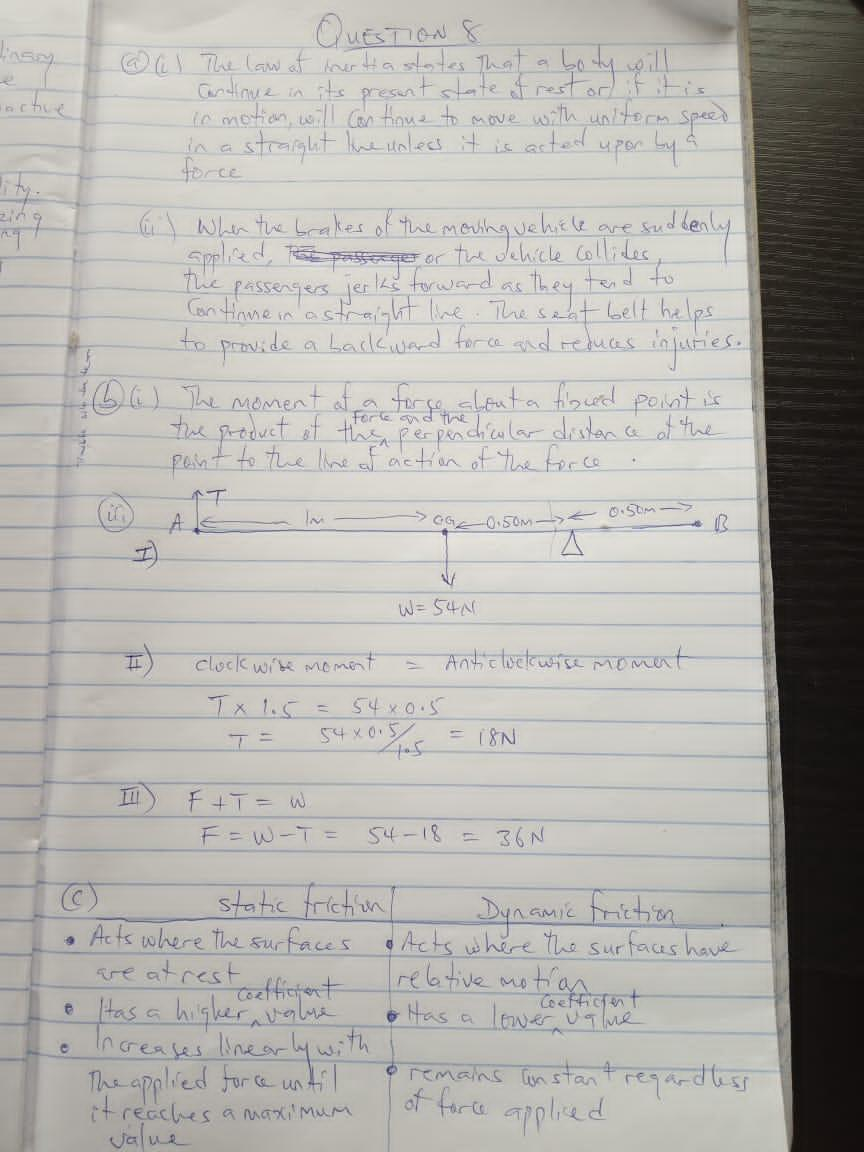
=============
(NO 11)
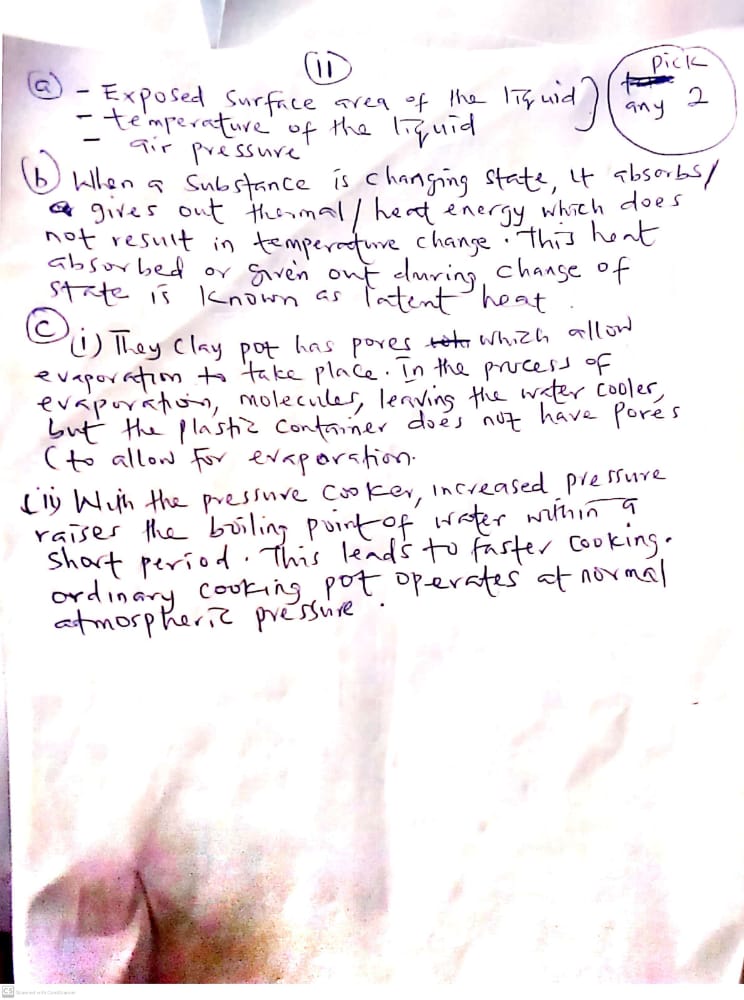
=============
(NO 12)
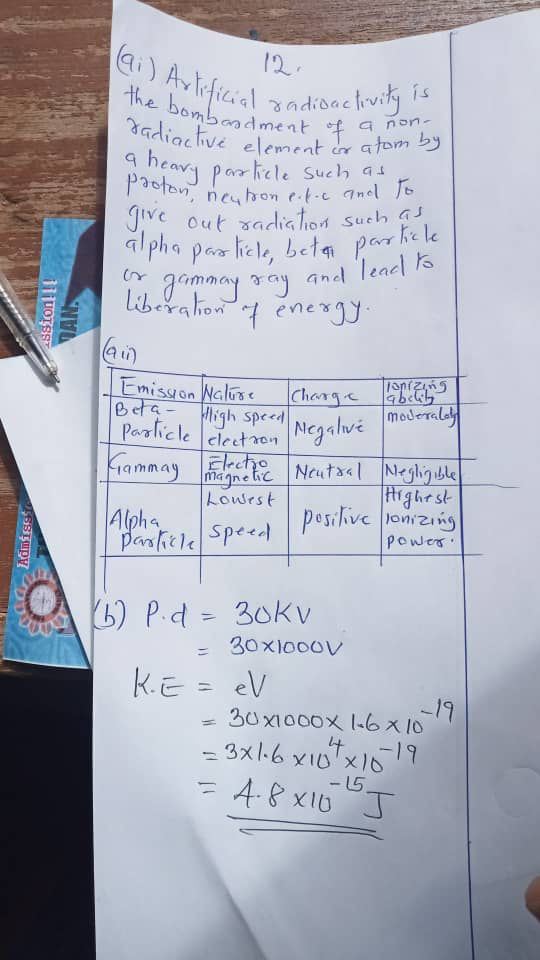
Answers Loading…
======================
======================
Answers Loading…
Keep Refreshing this Page
Waec Physics Obj And Essay Answers 2022: Welcome to the Expobite answer page where you will get verified and 100% authentic and correct Waec Physics Obj And Essay Answers 2022 for Wednesday 15th June 2022 both objective and essay (theory).
Examkey.net Physics Obj and Essay pin questions and answers for today, examkey, joberplanet, lasu-info, ceebook, noniwap, noniexpo, examspot, unn-edu, nairaland, utmeofficial, bestexamportal
WAEC 2022 Physics Obj and Essay Questions & Answers
I know you really want to pass and get an A in your Waec 2022 Physics Obj and Essay examination? then follow the below to subscribe to our Waec Physics Obj and Essay exam runz/expo, we promise to send you both questions and answers at least 2 hours before the Waec Physics Obj and Essay 2022 examination set to start by 9:30 am on Wednesday 15th day of June 2022:
Waec 2022 Physics Obj and Essay Objective and Essay Questions and Answers Subscription Price List:
- To receive the Waec 2022 Physics Obj and Essay questions and answers through WhatsApp, the subscription price is ₦600 MTN airtime/recharge card.
- To have access to our Expobite Answer Page at https://expobite.net/answer-page/ where the Waec Physics Obj and Essay answer 2022 will be posted also using the 4 digits PIN/PASSWORD/KEY we will give you once you subscribe, the subscription price is ₦500 MTN airtime/recharge card.
- To receive the Waec Physics Obj and Essay 2022 questions and answers via text message/SMS, the subscription price is ₦1,000 MTN airtime/recharge card.
How to Subscribe
Kindly follow the below simple steps to subscribe to our 2022 Waec Physics Obj and Essay questions and answers expo/runz for both Obj and Essay:
Choose your desired way of receiving answers
As I wrote above, we have 3 ways of sending questions and answers to our candidates, kindly choose between the 3 answer delivery methods available on our platform, ie, choose WhatsApp, PIN, or Text Message.
Transfer/Send Airtime to us.
You can either buy an MTN recharge card worth the subscription price to us or transfer it to our MTN line from your bank account through USSD or your Banking app.
Follow the below steps to successfully subscribe through the MTN recharge card:
– Buy a recharge card worth the amount of the subscription, open your WhatsApp and send the recharge card pins to us on 07062154881.
Follow the below steps to successfully subscribe through Bank airtime transfer (VTU):
– Open your bank app or USSD or go to POS and recharge our MTN line 07062154881.
We will confirm your subscription and get back to you immediately.
WAEC GCE Physics 2022 Answers & Questions for Essay Obj, WAEC Physics Practical Questions and Answers 2022, 2022/2023 WAEC EXPO ON PHYSICS QUESTIONS, WAEC Physics Questions and Answers for 2022/2023, WAEC Physics questions and answers, WAEC Physics Questions and Answers 2022/2023 Expo/Runs
PAST ANSWERS
(1a)
Political socialization is the process of acquisition and transmission of political knowledge and value by individuals from one generation to another.
(1b)
A nation simply means a group or body of people who share the same opinion, interest, judgment, political aspirations and consciousness and united by common ties.
Hence, below are the features of a nation :
(i) geographical
(ii) homogeneous cultural
(iii) religious
(iv) Homogeneous attributes and traditions.
===================================
(2)
(i) Constitutional division of power: Powers are constitutionally shared between the central authority and other component units.
(ii) Written and Rigid constitution: Codification of constitution on a single document/book which is difficult to amend.
(iii) Powers derived from the constitution: The three tiers of government derived their powers from the constitution.
(iv) Supremacy of the constitution: Constitution/law is strictly adhered as a regulation which everybody is subject to.
(v) Separation of power: Adoption of the theory of separation of power which enables the arms of government to function independently in order not to have clash of powers.
================================
OR
(3a)
A public corporation may be defined as a business organisation established, owned, managed and financed with tax payers money by government of a country with the main motive of making profit but to render essential services to members of the public.
(3b)
(i) Financial Control: The accounts of public corporations are audited from time to time by government Auditors and a copy of the Auditors’ report is submitted to the Minister which he presents to the parliament and this prevents financial mismanagement.
(ii) Judicial Control: As a legal entity which can sue and be sued, a public corporation can be dragged to court if it fails to act within the limits set by the law that established it and its action declared ultra vires.
(iii) Ministerial Control: Ministers that are answerable to the parliament are given extensive power over public corporations. These include powers to appoint and dismiss members of Board of Directors, determination of remunerations, conditions of service, approving all loans and major expenditures etc.
(iv) Public Control: Members of the public who consume goods and services of the public corporations exercise some form of control through criticisms they level against these corporations.
================================
(5)
(choose Any Five)
(i)Law:This is an important condition to the liberty of an individual.
(ii)Democracy: Under democracy political power is with the masses and so freedom is guaranteed.
(iii)power distribution:when powers are decentralized, more likely,men will be zealous for freedom.
(iv)vigilance: This is a sure safeguard vyo freedom.This means that citizens are alert and ready to fight any unreasonable interferences with their rights.
(v)independence of the judiciary: The essential of this to freedom of the individual cannot be underestimated. The judiciary and judges should be free from the interference of the executive and legislature.
(vi)Fundamental human rights: It is usually entrenched in a written constitution ,embodying the civil and political rights of the citizens and placing some limitations on the powers of those in government.
==================================
(6)
(Choose Any Five)
(i)Shortage of fund: The involvement of this organization in large scale operation affects its financial resources. This has created over time, shortage of funds.
(ii)Sovereignty of nation: The U.N.O cannot effectively enforce its decision because member states are not ready to surrender their sovereignty to the authority of the organization.
(iii)The veto power: Each of the five permanent members of the security council has veto power. This could be used at times to satisfy their selfish interest at the expense of fulfilling the objectives of the organization.
(iv)poverty: The inability of the united nation to effectively address the issue of poverty among member states.
(v)Revolution of conflicts: Inability of U.N.O to resolve conflicts among some member nation e.g Israel.
(vi)Difference in ideology: There difference in ideology, culture, politics, and methods used in pursuing economic goal. This may negate the evolution of lasting peace in the world.
=====================================
(8ai)
(i)National party of Nigeria (NDN) Alhaji shehu shagari.
(ii)The unity party of Nigeria chief obafemi awolowo.
(iii)The great Nigeria people party (GNPP) Waziri Ibrahim
(8b)
(i)Since independence, political party have showed that they are loyal to the electorate during campaign and would serve their Interest of vote to power.
(ii)They usually organize membership to reach all corners of the country
(iii)They have showed that their main objectives are to contests election,win and grow the country by all means
========================================
(9)
(i) Costly to run: The constitution operates a presidential system with duplication of political function thereby making it too expensive and costly.
(ii) Impeachment: The impeachment clause as stipulated in the constitution could be obeyed by the lawmakers.
(iii) Execution of programme: Separation of powers could result to delay in the implementation or carrying out of government programmes.
(iv) Activities in Government: This could be brought to stand-still because there was a problem between the executive and the legislature.
(v) Concentration of powers: The criticism that both executive president as both head of state and head of government has too much powers concentrated in him, creating the room for abuse of power.
(1a)
authority can be defined as the ability to give a command and to ensure that people yield to the commandment.It is associated with the ability to make decisions and enforce it.
(1b)
(i) political authority: this is the power given to a group of people by the constitution to make decisions and enforce obedience.
(ii) traditional authority; this is the power legitimized and defined by customs and traditions. It is acquired through inheritance.
(iii) coercive authority: this is the of authority that nvolved the use of force.
(iv)delegated authority: this is the authority conferred on a subordinate to exercise certain powers on specified authority.
(v) charismatic authority: this type of authority is based on extra ordinary personal qualities of an individual.
====================================
(3)
(i) membership of international organization: such as U.N.O, AU, OPEC, ECOWAS etc which many nations belong to had placed serious limitations to the sovereignty of such nations.
(ii) influence of powerful nation: powerful countries like U.S.A, USSR, BRITAIN etc have a lot of influence on the external sovereignty of smaller and weaker nations.
(iii) external aids: many poverty stricken nations mortgage their external sovereignty for economic , military and technical assistance.
(iv) supremacy of the Constitution: no matter the institution or a body in which sovereignty is located , the power of such body or institution is limited by the Constitution of the state. No body is above the law of the land.
(v) diplomatic immunity: diplomats representing their countries in other countries of the world have diplomatic immunity. Some of their actions can undermine the sovereignty of their host states.
====================================
(4a)
socialization; this refers to a process by which citizens are educated on the values, attitudes and beliefs of the political system. Political culture of a the society is transmitted from one generation to another through political socialization.
(4b)
(i) the family: children from politically conscious families tend to be more politically aware and interested in politics.
(ii) the school: it is in schools people starts to learn and practice how to play political roles.
(iii) the peer groups; a person is known by groups he keeps. One’s view including political views are influenced by ones playmates and friends.
(iv) the mass media; this includes radio, television, newspaper etc. Mass media passes different education to the people including political education.
(v) religious groups: it is difficult to divorce politics from religion. The mosque and churches direct their members on the political course to follow.
====================================
SECTION B
(5)
(i) appointment: the governor had power to appoint , promote, discipline and dismiss any public servants in the colony
(ii) policy formulations: he formulated economic and social policies for the colony
(iii)assent: the governor signed all bills passed by the legislative council
(iv) meeting: he presided over the meetings of both the executive and legislative council
(v) allocation of land: allocation of land acquired by the government were approved by him
(vi) responsible : the governor was responsible to the crown through the secretary of state for the colonies.
====================================
(6)
(i) the head of state/ president: the head of state sometimes called the president , is also the commander in chief of the Nigerian Armed forces. He presided over the meetings of the Armed Forces Ruling Council (AFRC), the council of state and the council of ministers.
(ii)Supreme military council (SMC)/ Armed forces ruling council (AFRC); this body is the highest legislative body of the military government in Nigeria. It comprises of the Head of state/ president who is the chairman, the chief of defence staff, the heads of the Army, Navy and Air Force popularly called the service chiefs, the inspector general of police , justice minister, secretary to the federal military government and high ranking military officers.
(iii) the council of state: this organ advises the Head of state on important national issues. It is made up of the president as the chairman, the chief of general staff, former Heads of state and all state military governors.
(iv) national council of ministers: this the organ that implement decisions and policies made by the AFRC. It is headed by the Head of state or president and assisted by the chief of General staff with all federal ministers as members.
(v)the state military governors: a state military Governor is the chief executive and the Head of the state military government and representative of the Head of state in the State. He is responsible to the Head of state and the commander in chief of the Armed Forces. The governor performed both the executive and legislative functions. He is the chairman of the state executive council. He appoints the state commissioners and other officers.
(vi) the judiciary; it remained the same as in the civilian era with Chief Justice as the head. Inclusive are various tribunals which had judges and military officers as members.
====================================
(7)
political party; this can be defined as an organized group of people who share similar political ideology, opinions, principles, interest and beliefs with the aims of gaining political power and governing the country.
(7b)
(i) education: political parties educates the people on their political rights
(ii) training ground: political parties creates a training ground for young politicians
(iii) serves as a link: it serves as a link between the government and the society
(iv) choosing of leaders: it provides the electorates opportunity of choosing good leaders for the country
(v) watchdog: political parties that are not in power act as watchdog on the activities of the party in power.
====================================
(9)
(i)foster friendly relations: nations of the world became friendly through economic, political and socio- cultural interactions.
(ii)lead to world peace: the hostilities in the world are reduced to the bearest minimum through economic, political and social- cultural interactions among the nations of the world.
(iii)lead to equitable re- distribution of natural resources: through economic interactions among the nations of the world, natural resources of the world that are unevenly distributed by the nature are equally re- distributed.
(iv) spread of technical knowledge: through interactions among the nations of the world, the technical knowledge of the so called advanced nations are spread to other less advanced ones
(v) cultural exchanges; social- cultural interactions among the nations of the world lead to exchange of cultural artifacts and cross cultural fertilizations.
(vi) attraction of foreign aids; a lot of foreign aids are attracted to the less developed countries through their interactions among with the more advanced nations.
====================================
(10)
(i)waste of financial, human and material resources; a lot of money was spent in prosecuting the war, a great number of life were lost and properties unestimated went into the war
(ii) hardship; innocent citizens and many homes were displaced coupled with severe hardship
(iii) dislocation of educational system; a good number of tertiary institutions were either dislocated or destroyed and some others closed down. Academic pursuit was paralysed.
(iv) truncated economic activities; economic activities were truncated, industries were no longer producing because of the war . The economy of the country was at a standstill.
(v) increased crimes rate; there was increased crimes rate in the country as displaced soldiers were not full demobilised
(vi) currency policy; the currency policy of the federal government made some sections of the country poorer.
====================================
(4)
The struggle for power between the Shuwa and Kanuri people in Borno caused a division that eventually led to the decline of the empire and borno lost its trade to Sokoto in the West and the control of the Eastern trans-Saharan trade routes which was the bedrock of the empire’s greatness was also lost. In other words the peasants were neglected and the dynasty made more demands on the meager resources of the poor. Although the dynasty ended, the kingdom of Kanem-Bornu survived. Umar could not match his father’s vitality ,and gradually allowed the kingdom to be ruled by advisers. Bornu began a further decline as a result of administrative disorganization, regional particularism, and attacks by the militant Ouaddai Empire to the east. The decline continued under Umar’s sons. In 1893, Rabih az-Zubayr led an invading army from eastern Sudan and conquered Bornu. Following his expulsion shortly thereafter, the state was absorbed by the British-ruled entity that eventually became known as Nigeria. From that point on, a remnant of the old kingdom was (and still is) allowed to continue to exist in subjection to the various governments of the country as the Borno Emirate.
==============================
(7i)
Removal of sectionalism: the Clifford constitution is the fact that it brought sectionalism into the politics of Nigeria. The Richard constitution which immediately followed the Clifford constitution sought to correct this. The constitution therefore sought to promote the unity of Nigeria.
(7ii)
Introduction of federalism: The Richard constitution is credited to have introduced the federal idea into the Nigerian body politics. This is because the constitution made provision for the creation of three regions, each with its Regional Legislative Council. This gave the indication that Nigeria may become a federal state in the future.
(7iii)
More consultative than Clifford constitution: There was more consultation with the Nigerians in the introduction of the Richard constitution. Though this was the case, the Richard constitution is also criticized for not engaging in enough consultation with the broad masses of Nigerians before its promulgation.
===================================
*NUMBER 8*
👉The Limited powers of Obas: In my last article about the pre-colonial administration od the Yorubas (west), i explained how the principle of checks and balances control the west.
👉Education: Education played a significant role in the partial success of the system of indirect rule in the west.
👉Less submissiveness of the people: Another reason why the system partially succeeded in the West was because, the subjects were not as submissive as their counterparts in the North.This made them not to accept indirect rule blindly.
👉Religion: Majority of the Yorubas were christians and Christianity is not as conservative as its counterpart in the North-islam.Christians therefore questioned the reasons for the introduction of indirect rule.
👉. Restoring authority In the Alafin Of Oyo: It is generally believed that the attempt made by lugard to restore authority in Yorubaland to the Alaafin Of Oyo instead of Ooni of Ife contributed immensely to the partial success of indirect rule in the West.
=============================
(9i)
Politicization of the Army;
One of the major reasons for military intervention in Nigeria’s politics in 1966 was the politicization of the Army. Following the independence of Nigeria, almost all the regions in Nigeria seeked to take total control of the military so as to use it as weapon over other regions. The Nigerian army was seriously politicized to the extent that appointments and promotions were based on tribe and political sentiments rather than seniority and merit.
(9ii)
Lack of free and fair election; After Nigeria got independence in 1960 the political system of the country was so damaged that even a free and fair election could not be conducted. In the election that brought Dr Nnamdi Azikiwe and Alhaji Tafawa Balewa as leaders of Nigeria, there was so much corruption and doubt about the result of the election.
(9iii)
Corruption; Apparently, corruption was also a major causative factor for the frequent military intervention in Nigeria in 1966. The military had to take over power because the rate of corruption in Nigeria was becoming unbearable. Nigeria was ranked the most corrupt country in Africa. Politicians became so corrupt and the economy of the country was mismanaged. The wealth of the country was spent recklessly and this encouraged incessant military coups in the country.
(9iv)
Political ambition of the military; I must not forget to mention that the military also intervened in the politics of Nigeria solely because of their political ambition. After independence, the military had the urge to take-over power from civilians, because they thought that they should be the once to rule the country since they have the responsibility to defend the territorial integrity and other core interests of the nation
SECTION A
(2)
(i) Subsistence and Commercial Activities:
Agriculture is the main economic activity. Grain is the staple diet, including Guinea corn, millet, maize, and rice. The Hausa also grow and eat root crops and a variety of vegetables. Cotton and peanuts are processed and used locally, but part of the harvest is exported. The Hausa practice intercropping and double-cropping; their main implement is the hoe.
(ii) Industrial Arts:
There are full-time specialists only where there is an assured market for craft products. Men’s crafts include tanning, leatherworking, saddling, weaving, dying, woodworking, and smithing. Iron has been mined, smelted, and worked as far back as there are Hausa traditions.
(iii) Trade:
Trade is complicated and varied. Some traders deal in a particular market, as distinguished from those who trade in many markets over a long distance. This dual trade strategy, augmented by the contributions of the Cattle Fulani, enabled the Hausa to meet all of their requirements, even during the nineteenth century.
(iv) Division of Labor:
Hausa society traditionally observes several divisions of labor: in public administration, it is primarily men who may be appointed, although some women hold appointed positions in the palace. Class determines what sort of work one might do, and gender determines work roles. When women engage in income-producing activities, they may keep what they earn
(v) Land Tenure:
The rural householder farms with his sons’ help; from the old farm, he allocates to them small plots, which he enlarges as they mature. New family fields are cleared from the bush.
(3)
(i)Each Igbo village was seen as a political unit inhabited by related families who were bounded by common beliefs and origin. Each family head in the village held the ‘Ofo‘ title and altogether formed the council of elders.
(iii)Among the council of elders, one was recognized as the most senior to others. He was the ‘Okpara‘. He could call for and adjourn a meeting, and could also give judgements as well.
WAEC Physics Questions & Answers 2022
(iii)the age-grade. The age-grade consisted of youngsters that belong to the same age-group. The senior age-group maintained peace and order in the village and also provided security to ward off external attacks, while the junior age-group concentrated on the sanitation of the community and other necessary duties.
(iv)the ‘Ozo‘ title holders. This expensive title was conferred on wealthy and influential men in the community who after getting the title become recognized and could then preside over meetings with the village elders.
(v)they were believed to be the mouthpiece of the gods e.g. Aro’s long juju. Even the council of elders consulted the priests on matters that were beyond their powers i.e. matters that needed spiritual intervention.
Number 4
i. The Nature of Islam:
The nature of Islam as a religion accepting polygamy to some extent, its tolerance of traditional African religions, its simplicity of doctrine and mode of worship helped propagators to make converts in Africa. These factors also made Islam easily adaptable to the African communities with which it came in contact. Again, the Islamisation of Africa was paralleled by the Africanisation of Islam. The making and sale of charms and amulets, which were believed to offer protection against evil forces and generally ensure success in life, were important in winning over converts.
ii. Trade:
Another major reason that led to the rapid spread of Islam in West Africa was the trans-Saharan trade network. From the seventh century onwards, Muslim traders from the Maghreb and the Sahara started settling first in some of the market centres in the Sahel and then in the Savanna areas. Al-Bakri, a renowned Arabic Scholar and merchant wrote in 1067, that the capital of ancient Ghana was already divided into two parts; about six miles apart, the Muslim traders’ part which had as many as twelve mosques and the King’s part had one mosque for the use of the king’s Muslim visitors. It was these resident Muslim traders who converted the rulers and the principal local town’s people to Islam. Also, according to Kano Chronicles, during the reign of Yaji, the King of Kano from 1349 to 1385, the Wangarawa came from Melle bringing the Mohammedan religion. These examples grew the process of Islamisation or conversion to Islam, as it gathered momentum.
iii. Activities of Muslim Clerics:
Islam also spread into West Africa through the activities of Muslim clerics, marabouts and scholars or mallams. These clerics or learned men founded their own religious centres which attracted students from all parts of the Western Sudan and who on the completion of their studies and training went back to their own homes to win converts. Many of them went on lecture or missionary tours to convert people, while others became advisers to Sudanese Kings on how to become effective rulers. Some clerics devoted a great deal of their time to writing books and instructions on all aspects of Islam for the education and conversion of people or the purification and strengthening of Islam. Some examples of clerics follow:
Ibu Khadija al-Kumi, a Muslim missionary and Abu Ishaq al-Sahili, a poet, scholar and architect from Granada were both invited by Mansa Musa to accompany him on his return from his celebrated pilgrimage in 1324/5. Both of them settled in Mali where they taught Islam. Al-Sahili also designed the great mosque of Timbuktu as well as a magnificent palace for Mansa Musa in the capital of Mali.
Again, the great Mande scholar, Abd Rahman Zaite (now identified as Abd al-Rahman Jakhite) settled in Kano on the invitation of Rumfa, the King of Kano. He built a mosque and introduced the practice of Koran recital and other devotional exercises.
Another brilliant Berber scholar called Abd al-Rahman al-Maghili (1477-78) established his Zawiyaie Islamic school in Tuat in the Sahara, and from there went on a missionary tour of the Western Sudan which lasted from 1492 to 1503. During this tour, he visited Air, Takedda, Kano, Katsina and Gao and preached to both rulers and commoners.
iv. Activities of Rulers:
Islam gained ground in West Africa through the activities of the individual rulers. The rulers of the Western Sudan encouraged the trans-Saharan trade and extended hospitality to both traders and visiting clerics, but perhaps one of the most important ways in which they encouraged acceptance of Islam was through their own conversion. With a Muslim King or ruler it rapidly became a matter of prestige among the aristocracy also to convert to Islam in many kingdoms. Many rulers made considerable efforts to encourage Muslim institutions such as Islamic tax and legal systems or the provision of facilities such as mosques, through the appointment of Muslim officials such as judges and butchers who observe the Islamic code and to lead prayers, celebrating Muslim festival and ordering every town under their control to observe the ritual prayers. The pilgrimages that many of the rulers undertook – such as Mansa Musa and Askia Mohammed — had a considerable spiritual effect increasing their determination both to strengthen and purify Islam and to spread it even further.
v. Holy War:
What is more, another way in which Islam was introduced and spread in West Africa in general and the Western Sudan in particular was the militant jihad, or the waging of holy war against infidels or lukewarm Muslims. This method allowed the third and final stage of the process of Islamisation to reach its climax with the nineteenth-century jihad in the Western Sudan, between Mali and Senegambia and Hausaland in northern Nigeria.
The first jihad in the Western Sudan which has accounts was that waged by the head of the Sudanese confederation. It was Tarsina against the Sudanese people in 1023, soon after his return from the pilgrimage to Mecca. He was killed during these clashes. The second is that of the King of Takrur, War-Ajabbi, before his death in 1040. The third and the best known of these early jihads was the one declared by the Almoravid movement of ancient Ghana between 1048 and 1054 by the scholar, Abdallah Ibn Yasin. Between 1056 and 1070s, the Almoravid conquered the whole area between ancient Ghana and Sijilmasa. By 1087 the Almoravid Empire stretched from the Senegal in the south across the Mediterranean to Spain in the north.
vi. Inter-marriage:
Islam also spread on to West Africa through inter-marriages. The Muslim merchants from North Africa came down settled and married the African women who became Muslims including their children.
(6a)
i. The constitutions enacted during this period were the Clifford Constitution in 1922.
ii. The Richards Constitution in 1946.
iii. The Macpherson Constitution in 1951.
iv. The Lyttleton Constitution in 1954.
v. In 1946 a new constitution was approved by Westminster and promulgated in Nigeria.
WAEC 2022 Physics Question And Answer (Obj & Essay)
(6b)
i. In the executive council, The ministers were not given portfolios. They acted as mere officers of government. They had no power to issue orders to their directors. However, they were collectively responsible for all policy decisions.
ii. There were also criticism, on the creation of unequal status and adoption of two houses of legislature (bicameral in the Northern and Western regions only).
iii. The continued appointment of special members in the House of Representatives, House of assembly and the Electoral college system of election, were some of the serious criticisms.
iv. Even though the 1951 constitution was the result of series of consultations with the various levels of government and educated elites, it received some criticisms from the Nigerian nationalists who saw it as a constitution built on compromise.
v. It could be stated that the 1951 constitution enjoyed wide publicity. Generally the constitution could be seen as constitution that recognized the demands of the people.
(8)
(i) Ethnically based Federal Regions, with uneven size and power:
The first structural weakness which set the First Republic in Nigeria for political crisis was its ethnically- based federal regions and the asymmetry in size and power between them. Upon independence, Nigeria was composed of three federating regions: Northern, Eastern and Western regions. (Later in 1963 a new region, the Mid-West, was carved out of the West following a crisis in that region). Each of the regions was dominated by one of the country’s three largest ethnic groups: Hausa-Fulani in the North, Yoruba in the West and Igbo in the East. This arrangement presided over by the dominant ethnic groups placed minorities at a considerable disadvantage in the competition for jobs and resources at the regional level.
(ii) Ethno-Regional Political Parties:
The second structural weakness which afflicted the First Republic was the emotive association between political party and ethno- regional identity. This meant politics largely “revolved around ethnic-based regional…parties”. Reflecting the tripodal ethnic balance, three parties bestrode the political scene like titans and thus shaped the destiny of the First Republic: Northern People’s Congress (NPC), the Action Group (AG), and the National Council of Nigerian Citizens (NCNC). All three parties originally emerged out of ethno-cultural associations: NPC from Jam’iyar Mutanen Arewa (Association of Peoples of the North) AG from Egbe omo Oduduwa (Society for the Descendants of Oduduwa.
(iii) The political alignment which formed after the 1959 election:
It can be argued that the political constellation which emerged after the 1959 election was the most potent of the young republic’s structural weaknesses. It had huge impacts on the stability of the soon to be an independent nation. The North-South governing coalition between the NPC and the NCNC, variously described as “unnatural”, a coalition of “strange bedfellows”, only accentuated the republic’s structural imbalances. On immediate observations, it was certainly a partnership of unequal – with the NPC being by far the more powerful of the two governing parties. This meant the NCNC was always acutely sensitive to the tenuousness of its share of power.
(iv) The fear of ethnic domination:
The last and deepest of the structural weaknesses was the fear of ethnic domination which pervaded the politics of the First Republic. The Yorubas and Igbos in the two southern regions feared that the Hausa-Fulanis would use the North’s demographic preponderance to perpetuate northern hegemony and monopolise federal resources for their region; Hausa-Fulanis, in turn, feared that in an open contest, the Yorubas and Igbos, being the more educated, would dominate the political and economic structures of the federation.
WAEC Physics Practical Questions and Answers 2022
(v) The disintegration of the AG, 1962-63:
The collapse of the AG’s political power between 1962 and 1963 produced far-reaching effects. The crisis that engulfed the party stemmed from its “staggering defeat” in 1959. It had been ‘relegated’ to the opposition. The NCNC had made impressive inroads into its regional heartland, securing for itself 21 seats in the AG’s political turf by exploiting minority discontent within the Western Region.


